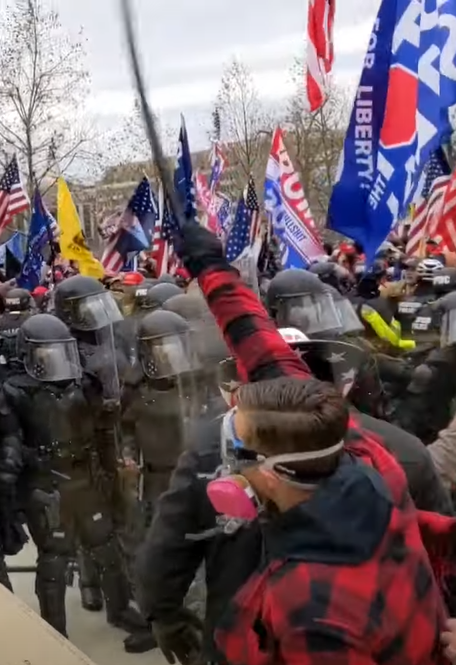The Triumph of the Criminal Class...For Now
The explosion of online right-wing, conspiracy theory-centric networks, podcasts, and similar digital sewers has created a permission structure for many Americans to embrace their worst selves and the worst political actors.

Exactly four years ago, Donald Trump and his violent supporters tried to overthrow the Republic. Two months ago, over 77 million Americans ignored that history and handed control of the federal government back to Trump and his insurrectionist followers. Today, the House will ratify the voters' decision to put a civilly adjudicated sexual abuser, corporate fraudster, and insurrectionist in the White House.
As the country says goodbye to former President Jimmy Carter, it is also preparing for the renewed rein of a person who is the moral and political antithesis of the man from Plains, Georgia.
I turned 14 a month after Carter took office. Growing up in politically and religiously conservative Springfield, Missouri--the world-wide headquarters of the Assemblies of God evangelical juggernaut--I had high hopes that Carter would set a good example as America's chief executive. And on a personal level, he did.
But by the time of my senior year in high school, Carter's limitations as a leader had become painfully evident.
Key events at home and abroad--the seizure of American diplomats by the new Islamic regime in Iran, the Soviet invasion of Afghanistan, and the worst inflation and interest rates in decades--all combined to spell political doom for an honest man who had restored dignity to the presidency in the aftermath of Nixon's epic criminality.
His replacement, actor-turned-politician Ronald Reagan, portrayed Carter as weak and incompetent, and forcefully rejected the idea that America was in irreversible decline. For the 17-year-old me in the fall of 1980, Reagan's vision of a resurgent, prosperous America feared by its enemies and envied by its friends was irresistible. I went door-to-door in my neighborhood campaigning for him even though I couldn't vote.
I realize now that Reagan was the first iteration of the "Make America Great Again" movement.
First, like Trump, Reagan blamed his opponent for every single major domestic or foreign policy ill facing the country. Reagan was a far more polished communicator than Trump will ever be, and if you watch the Reagan-Mondale debates you'll see why.
Reagan was also willing to pardon criminals who blatantly violated the constitutional rights of Americans--in this case former senior FBI officials responsible illegal break-ins. And a fresh set of nationwide FBI constitutional rights violations against Americans began on Reagan's watch, with those opposed to his policies in Central America among the first targets.
I've thought about this particular parallel a great deal of late in light of Trump's public commitment to pardon many, and perhaps all, of the J6 insurrectionists previously convicted or pled out for their role in the attack on the Capitol. If Trump follows through on this pledge, he will make Reagan's pardons of Edward Miller and Mark "Deep Throat" Felt pale by comparison.
Second, in 1980 as was the case this time around, voters punished the incumbent Administration for a bad economy. In 1980, the economy was, in fact, terrible: inflation and interest rates were in the double digits. That was not remotely the case in 2024, but a Reuters headline for a story three weeks before the election said it all: "US economy is partying, but voters are hungover."
Why the disconnect? Because Trump's campaign kept telling any voter who would listen that the American economy sucked and Biden-Harris were the reason why. The Trump campaign also gambled that they could get low propensity voters to turn out with that message. It was a key bet they won, and big.
There's no question that the atomization of the information landscape over the last 20 years has contributed to Trump's success in getting his message out. Major newspapers and television networks are increasingly irrelevant political players in terms of shaping the public narrative around candidates and issues. The explosion of online right-wing, conspiracy theory-centric networks, podcasts, and similar digital sewers has created a permission structure for many Americans to embrace their worst selves and the worst political actors.
But none of that excuses the choice of millions of otherwise normally politically oblivious Americans to vote for a man that many readily admitted was a despicable person and unfit for the office. If their choice had only impacted their own fate, I wouldn't give a damn, but unfortunately their choice now has consequences for all of us.
One thing I know for certain is this: I will oppose any action by the incoming Administration that violates the Bill of Rights or seeks to end the Republic that has stood for nearly 250 years. I hope you feel and will act exactly the same way.
Thanks for reading The Sentinel. If you're not currently a subscriber, please consider becoming one as doing so is free through 2025 and it's an easy way to show your support for my work. Also, please share this piece with family, friends, and anyone else you believe would benefit from reading it.





